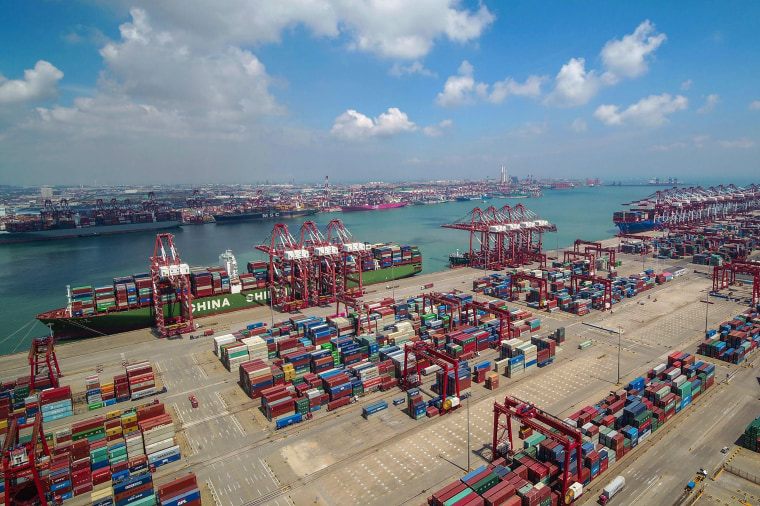President Donald Trump on Wednesday linked the ongoing trade talks with China to the humane resolution of protests shaking the semi-autonomous territory of Hong Kong.
"Of course China wants to make a deal. Let them work humanely with Hong Kong first!" he said on Twitter.
In his remarks, the president appeared to suggest a personal meeting with Chinese President Xi Jinping to help resolve the crisis.
Trump also reiterated claims that "thousands" of companies were leaving China.
Trump also said China needed a trade deal more than the U.S., although China has argued otherwise. The comment followed his announcement that he was extending his Sept. 1 deadline for 10 percent tariffs on billions of dollars worth of Chinese imports such as cell phones, laptops and consumer goods until Dec. 15.
China's Ministry of Foreign Affairs didn't rule out a meeting in a statement to NBC News, saying the two heads of state have "maintained contact all along."
"We hope that the U.S. side will meet half-way with the Chinese side, implement the consensus reached by the two heads of state in Osaka, and on the basis of equality and mutual respect and through dialogue and consultation," said Hua Chunying, a spokeswoman to the ministry, referring to a Trump-Xi meeting on the sidelines of the G-20 economic summit in Japan in late June.
China's economy — the world's second largest — does appear to be cooling, with urban unemployment jumping to 5.3 percent in the first half of the year, compared with 5.1 percent in the same period last year.
Industrial output, meanwhile, was at a 17-year low in July while the yuan has slipped versus the dollar.
Despite the tensions with the U.S., more than 80 percent of member companies with the American Chamber of Commerce in China reported they expected to see economic growth in 2019, but at a lower level than government estimates.
Wall Street, meanwhile, took a battering on Wednesday after movements in the bond market signaled the sharpest indication yet of an approaching recession.
Trump blamed the Federal Reserve for the market plunge, calling Fed Chairman Jerome Powell “clueless” in an afternoon tweet.
How tensions in Hong Kong would factor into China-U.S. trade talks remains unclear despite the president raising the issue. China has frequently warned against outside interference with its authority over Hong Kong.
"Hong Kong affairs is purely China's internal affairs," said Chunying, China's foreign affairs spokeswoman. She added that Trump has previously stated China should have autonomy in resolving the issue in Hong Kong because the territory is part of the country — a perspective China hopes the U.S. will maintain.
Protests have gripped Hong Kong since June after a controversial extradition bill left many fearful it would lead to the erosion of residents' rights, giving more power to Beijing.
The disruption and chaos have plunged the stock market in Hong Kong — an Asian financial hub — to a seven-month low, adding to the pressures on both Hong Kong and China's economies.
The territory could be pushed into a recession, research firm Capital Economics has warned, with a growing risk of "an even worse outcome if a further escalation triggers capital flight."
On Thursday, Hong Kong's government announced a $2.44 billion package to prop up the economy, amid fears of lower growth rates. The Chinese Securities Association of Hong Kong also said the city's reputation would be seriously damaged if the unrest did not stop soon.
The former British colony became a special administrative region of China in 1997. Unlike those living in mainland China, the territory's 7 million residents can freely surf the internet and participate in public protests.
Protests have become increasingly violent, with clashes breaking out on the streets and most recently, at the city's busy international airport, resulting in the cancellation of hundreds of flights. The demonstrators are not only demanding that the extradition bill be revoked, but also that the territory's Beijing-backed chief executive Carrie Lam step down and the police's alleged use of excessive force be investigated.

Chinese state broadcaster CCTV aired footage of an anti-riot police drill involving 12,000 police officers and dozens of armored and assault vehicles, helicopters and boats in Shenzhen, which borders Hong Kong earlier this month. More recently, a satellite photo released by Maxar Technologies this week showed dozens of paramilitary vehicles and members of China's People's Armed Police assembling at a Shenzhen stadium on Monday.
Meanwhile, more protests were planned across several districts of Hong Kong on Thursday and the Civil Human Rights Front — behind the million-strong marches in June — plans another demonstration for Sunday.
Linda Givetash reported from London, and Eric Baculinao and Dawn Liu from Beijing

